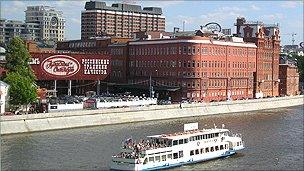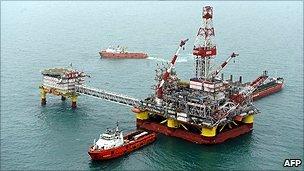Should Russia be in the Bric club of dynamic economies?
- Published

The Red October factory's story reflects the history of Moscow
When the term "Bric" countries was coined in 2001, it was used to describe the potential for development and growth of Brazil, Russia, India and China, but some now doubt whether Russia belongs in that "club".
The Red October chocolate factory sits on the banks of the Moskva river, just a few hundred yards downstream from the Kremlin.
Once - as the name suggests - it was one of the pride-and-joys of Soviet industry or, at least, of Soviet confectionery manufacturing, but now it has been transformed into luxury city centre apartments for the new super rich of Russia.
It is surrounded by trendy wine bars and restaurants and, in a small way, it symbolises how Moscow has gone from the capital of communism to the city with the largest number of billionaires in the world in a few short decades.
The Kremlin is now surrounded by swanky hotels and apartment blocks, top-end jewellery and clothes shops selling exclusive Western brands, and endless traffic jams which seem to consist mainly of BMWs, Range Rovers and Bentleys.
'Exclusive club'
But all of this money does not necessarily mean that Russia belongs in the same club as all the other Bric nations.
The term was coined by Jim O'Neill, a top economist at Goldman Sachs, when he was trying to come up with a word to describe where he thought world growth and economic power was going to come from in coming decades - Brazil, Russia, India and China.
These days South Africa is often added to make the word Brics but the idea is just the same. But does Russia belong in that exclusive club?
Certainly Alexander Morozov, chief Russian economist at HSBC in Moscow, has his doubts:
"I think it would be wrong to say that Russia will be able to develop strong growth rates in coming years. Brazil, India and China can do this - they have the potential to industrialise further and employ additional labour. All the labour that Russia has is already employed.
"Therefore the efficiency gains are not the same as when you have a green-field site and just employ workers from the neighbouring village or province."
'Unwanted products'
While Brazil, India and China have seen large increases in population with huge numbers of young, educated workers desperate for jobs, Russia's population went into decline after the end of the Cold War. As did much of its heavy industry.
While the other three Bric nations have started industrialising almost from scratch, Russia was left with a swathe of old and appalling, inefficient industries from the Soviet era.
Anders Aslund is a Swedish economist who helped Russia privatise much of its industry in the 1990s, but he says much of it was not fit enough to survive in the private sector.
"Much of machine building has simply collapsed," he says, "and much of manufacturing as well. They were producing bad products that nobody wanted to buy."
But some Russian industries are doing well - its commodity producers.
Russia is now the largest oil exporter in the world and the second largest exporter of natural gas. Its petrochemical and steel industries have also prospered.
Welcome though this is, it is not what is really happening in the other Bric countries.
Corruption
Some think that Russia has more in common with Saudi Arabia than with China.

Russia is the world's largest producer of commodities
The Russian government, for instance, relies on oil and gas sales for 40% of its tax revenues. That means the current high oil price is filling the Kremlin's coffers like never before.
But the country's infrastructure is crumbling and, as with many oil-producing countries, corruption is rife in Russia - a further brake on economic growth and development.
Perhaps the best judge of whether Russia really deserves to be counted amongst the Bric nations is Alexander Lebedev, the billionaire Russian oligarch, who has been outspoken in his criticism of corruption in his home country.
When I interviewed him in his luxurious and well guarded offices in one of Moscow's smartest districts, he was quite clear on the subject.
"Instead of Bric it should be Bic. For the real comparison, look at what is going on in infrastructure in China. You just stand there gawping in disbelief. Why are they not doing it here?"
Russia has many things going for it, a huge under-developed land mass, massive mineral resources and some brilliant industries - nuclear power and space technology among them.
But is it really a young, vibrant, industrialising country that is taking on the West and winning, like Brazil, China and India?
Because it certainly does not feel like it is.
Jonty Bloom is reporting from Russia for Radio 4's The World Tonight broadcast at 2230BST on weekdays. Hear his report on the Russian economy on Tuesday 7 June and on Russian politics on Wednesday 8 June or online at the above link.
- Published14 April 2011